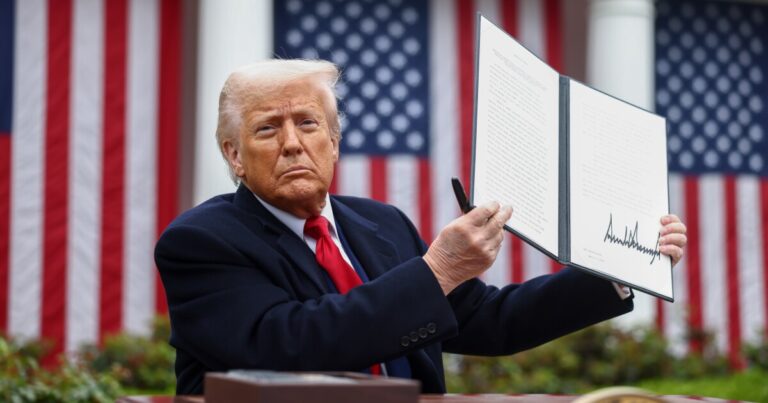
The tariff regime unveiled last week by President Donald Trump has injected a significant dose of uncertainty into the banking industry and unleashed the specter of an economic slowdown.
Banks and credit unions, to be sure, are not directly impacted by the sweeping tariffs being imposed on about 90 countries, including China, Japan and the European Union. But because they do business with industries that will be affected, they too are bracing for the consequences of a global trade war.
Banks are already feeling some pain in their stock prices. The KBW Nasdaq Bank Index, which tracks the performance of the 24 largest U.S. banks, was on a roller coaster ride Monday after sinking Thursday and Friday following Trump’s tariff announcement. At market close, the index was up about 1%.
The tariffs went into effect on Saturday. Additional levies may go into effect on Wednesday.
Tariffs in general are “unconditionally bad” for banks because they cause economic disruption, Suryansh Sharma, an equities analyst at Morningstar DBRS, told American Banker on Monday.
“Any form of disruption is not good for the economy or for the banks,” said Sharma, who covers JPMorgan Chase, Bank of America, Citigroup and Wells Fargo, the nation’s four largest banks.
In the near term, banks will likely be keeping close tabs on areas such as net interest margin, loan growth, fee income and credit costs, all of which ultimately affect their profitability, Sharma said. A lot will depend on whether the economy slows down or goes into a recession, which would potentially reduce loan growth, lower fee income and increase credit costs, he said.
Those topics and more will likely be top of mind as banks kick off their quarterly earnings season on Friday.
The impacts of tariffs on banks are likely to be wide-ranging. In the meantime, here are four areas to watch.
Trade financing
Banks that provide trade financing as part of their commercial banking services may see a ramp-up in activity as a result of the tariffs. At Citizens Financial Group, a specialty trade and supply chain finance department within the company’s commercial bank works with both domestic and international clients to reduce risk and facilitate cross-border payments.
The department provides classic trade finance products such as standby letters of credit, which guarantee payments, and commercial letters of credit, which offer security to buyers.
The…
Read More: What Trump’s tariffs mean for banks



